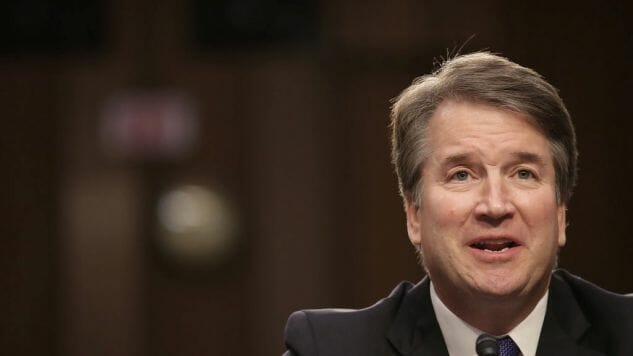On the surface, the Brett Kavanaugh situation seems to have settled into a stalemate—unless Leland Keyser or Mark Judge or somebody unexpected says something to the FBI that’s significantly different from the previous statements they’ve released, nobody will be able to prove what happened on that night in 1982, and presumption of innocence will likely win the day in a GOP-majority Senate.
However, there’s a second narrative developing, and it could became a classic of the “it’s not the crime, it’s the cover-up” genre. Nathan J. Robinson at Current Affairs wrote a long, thorough, and damning analysis of all the ways Kavanaugh seems to have lied multiple times under oath at the Senate judiciary committee hearing. It’s a long read, but so worth it—we previously wrote about his deceptive framing of Leland Keyser’s reaction, when he falsely claimed that she “refuted” Christine Ford’s account though in fact she said she believed it but could not remember the night in question—but Robinson covers that and so much more.
He pays particular attention to the drinking aspect of Kavanaugh’s testimony, which appears rife with questionable defenses. That argument was bolstered Monday morning when the New York Times ran a statement from Kavanaugh’s Yale classmate Chad Ludington claiming that yes, Kavanaugh was a serious drinker, and yes, he did become “belligerent and aggressive.”
Ludington:
n recent days I have become deeply troubled by what has been a blatant mischaracterization by Brett himself of his drinking at Yale. When I watched Brett and his wife being interviewed on Fox News on Monday, and when I watched Brett deliver his testimony under oath to the Senate Judiciary Committee on Thursday, I cringed. For the fact is, at Yale, and I can speak to no other times, Brett was a frequent drinker, and a heavy drinker. I know, because, especially in our first two years of college, I often drank with him.
Ludington was a varsity basketball player at Yale, and Kavanaugh enjoyed socializing with athletes, so the two ran in the same social circle for a time. He described what reads like his breaking point with Kavanaugh:
On one of the last occasions I purposely socialized with Brett, I witnessed him respond to a semi-hostile remark, not by defusing the situation, but by throwing his beer in the man’s face and starting a fight that ended with one of our mutual friends in jail.
Ludington makes sure to note that he doesn’t think this kind of behavior in a young man should be disqualifying, or necessarily follow him around for the rest of his life (“I would be a hypocrite to think so”). But he does make the same point that Robinson made at Current Affairs, which is that Kavanaugh wasn’t being truthful when he downplayed his drinking at the Senate hearing.
I do believe that Brett’s actions as a 53-year-old federal judge matter. If he lied about his past actions on national television, and more especially while speaking under oath in front of the United States Senate, I believe those lies should have consequences. It is truth that is at stake, and I believe that the ability to speak the truth, even when it does not reflect well upon oneself, is a paramount quality we seek in our nation’s most powerful judges.
At that hearing, Sen. Richard Blumenthal (D-CT) clumsily attempted to introduce the concept of Falsus in uno, falsus in omnibus, which is a Latin phrase meaning “fale in one thing, false in everything.” It’s used in common law, and it means exactly what it sounds like—if a person tells little lies, they lose their credibility even in larger matters.
We are now entering the Falsus in uno, falsus in omnibus phase of the Kavanaugh hearings, where even though we may never learn what truly happened between him and Christine Ford—if anything—his subsequent lies under oath look increasingly disqualifying. Even if he’s innocent of the primary accusation, is this the kind of man people want on the Supreme Court?
It remains to be seen. But for the first time, there’s a real possibility that Brett Kavanaugh’s undoing will not be the crime, but the cover-up.
